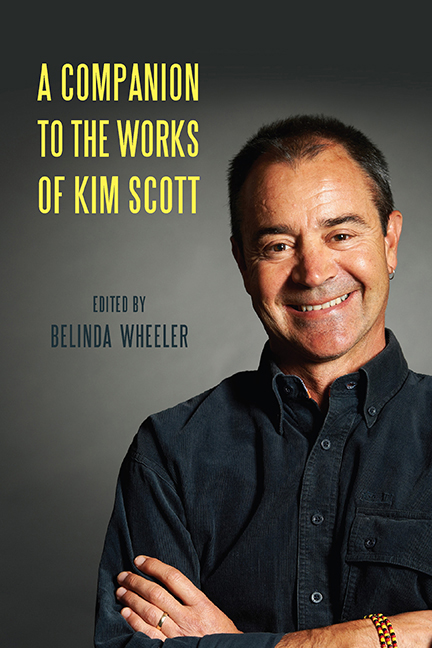Book contents
- Frontmatter
- Contents
- Foreword
- Acknowledgments
- Note on Orthography
- Chronology of Key Writings
- Introduction
- 1 Kim Scott’s Publishing History in Three Contexts: Australian Aboriginal, National, and International
- 2 Kim Scott’s True Country as Aboriginal Bildungsroman
- 3 The Land Holds All Things: Kim Scott’s Benang—A Guide to Postcolonial Spatiality
- 4 Kim Scott’s Kayang and Me: Noongar Identity and Evidence of Connection to Country
- 5 “Wreck/Con/Silly/Nation”: Mimicry, Strategic Essentialism, and the “Friendly Frontier” in Kim Scott’s That Deadman Dance
- 6 The International Reception of Kim Scott’s Works: A Case Study Featuring Benang
- 7 Traumatic Landscapes: Inscribing Spectrality and Identity in Kim Scott’s “A Refreshing Sleep,” “Capture,” and “An Intimate Act”
- 8 Spatial Poetics and the Uses of Ekphrasis in Kim Scott’s “Into the Light” and Other Stories
- 9 The Poetry of Kim Scott
- 10 The Wirlomin Project and Kim Scott: Empowering Regional Narratives in a Globalized World of Literature
- 11 Kim Scott as Boundary Rider: Exploring Possibilities and New Frontiers in Aboriginal Health
- 12 An Interview with Kim Scott
- Notes on the Contributors
- Index
2 - Kim Scott’s True Country as Aboriginal Bildungsroman
Published online by Cambridge University Press: 08 May 2021
- Frontmatter
- Contents
- Foreword
- Acknowledgments
- Note on Orthography
- Chronology of Key Writings
- Introduction
- 1 Kim Scott’s Publishing History in Three Contexts: Australian Aboriginal, National, and International
- 2 Kim Scott’s True Country as Aboriginal Bildungsroman
- 3 The Land Holds All Things: Kim Scott’s Benang—A Guide to Postcolonial Spatiality
- 4 Kim Scott’s Kayang and Me: Noongar Identity and Evidence of Connection to Country
- 5 “Wreck/Con/Silly/Nation”: Mimicry, Strategic Essentialism, and the “Friendly Frontier” in Kim Scott’s That Deadman Dance
- 6 The International Reception of Kim Scott’s Works: A Case Study Featuring Benang
- 7 Traumatic Landscapes: Inscribing Spectrality and Identity in Kim Scott’s “A Refreshing Sleep,” “Capture,” and “An Intimate Act”
- 8 Spatial Poetics and the Uses of Ekphrasis in Kim Scott’s “Into the Light” and Other Stories
- 9 The Poetry of Kim Scott
- 10 The Wirlomin Project and Kim Scott: Empowering Regional Narratives in a Globalized World of Literature
- 11 Kim Scott as Boundary Rider: Exploring Possibilities and New Frontiers in Aboriginal Health
- 12 An Interview with Kim Scott
- Notes on the Contributors
- Index
Summary
The cultural representatives of contemporary black Australia, its writers and artists … can now appropriate and press into service the very tools from their enemy's arsenal: written texts and the English language itself. If European texts had functioned as instruments of cultural destruction for the blacks, the Aboriginal texts can now serve as means of cultural regeneration.
—Emmanuel S. Nelson, “Literature against History,” 31KIM SCOTT's True Country (1993) recounts the story of a young teacher, Billy Storey, who volunteers to work at a remote Aboriginal outpost in Australia, a mission station called Karnama. The Aboriginal identity of Billy's paternal grandmother has only recently been revealed to him, and the story begins as a somewhat confused quest for Aboriginal connections. The story that is the novel and the experience of reading the novel have much in common with the German Bildungsroman genre. First popular as a classification for certain eighteenth-century novels, the Bildungsroman usually focuses on the development of an individual finding his way from adolescence into adulthood, figuring out an individual identity for himself. In the earliest examples, the individual was typically male. More recently, as former colonies have gained independence, the Bildungsroman form has become a particularly viable and important genre that reflects postcolonial struggles for identity. The Bildungsroman has burst its European origins and become a genre particularly suitable in postcolonial contexts; indeed, it has become a prime example of how indigenous peoples can use European literary forms effectively as part of their own arsenal of cultural resistance and as a source for regeneration.
The two elements of the compound noun Bildungsroman are the words Bildung and Roman. Whereas the English translation of Roman is “novel,” Bildung is more difficult to translate. Bildung is the nominative form of the verb bilden, to form. The word Bildung is often translated into English as “education,” losing the strong sense of formation and acculturation that resonates in German. Bildung cannot be adequately translated out of German and retain its full significance. Although convention varies, I italicize both Bildung and Bildungsroman in this essay to emphasize the particularly German (foreign) roots of the terms, as a reminder not to reductively translate the word into a less precise signifier.
- Type
- Chapter
- Information
- A Companion to the Works of Kim Scott , pp. 25 - 36Publisher: Boydell & BrewerPrint publication year: 2016



